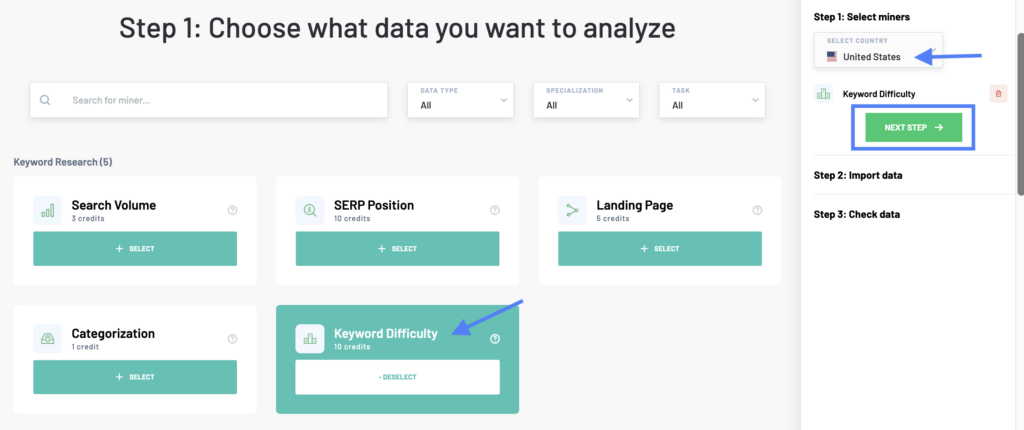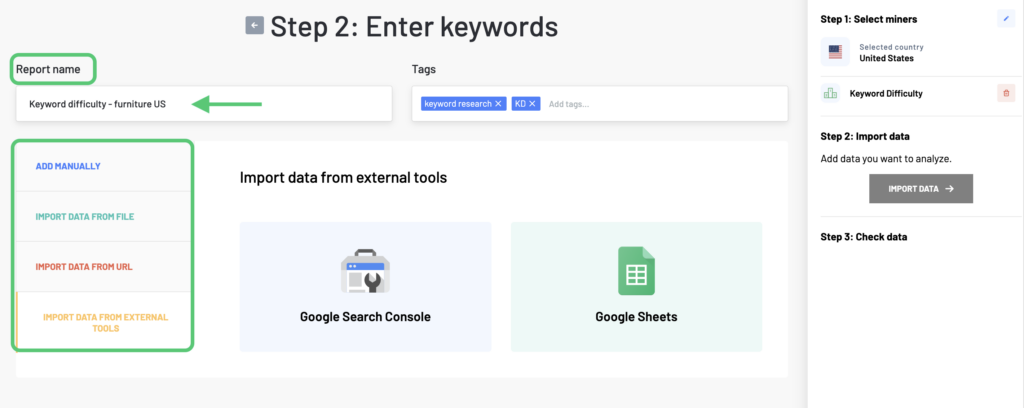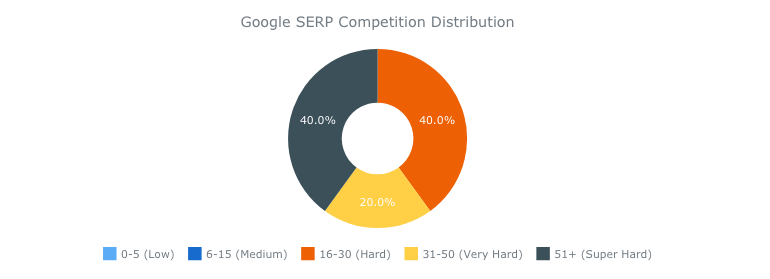Keyword difficulty is a metric used in SEO to evaluate how difficult it is to rank for a particular keyword in the search engine results pages (SERPs). Marketing Miner can help you analyze keyword difficulty metric even for hundreds or thousands of keywords in one report.
How is Keyword Difficulty measured?
Keyword difficulty is a metric used by SEO professionals to quantify how easy or hard it is to break into search engine results. Estimating your keyword difficulty can help you choose better keywords to prioritize.
The Keyword difficulty score ranges from 0 (almost no competition) to 100 (highly competitive). In general, the higher the number, the more difficult it is to rank on the first page of an organic search.
This metric is calculated using the following factors:
- The number of keywords displayed in the meta title for the first 100 search results.
- The number of keywords displayed in the meta description for the first 100 search results.
- The domain authority of the first 10 search results.
In addition to this metric, you can also determine the competitiveness of a keyword by looking at its average CPC or search volume. Higher CPC and higher search volume often indicate how competitive the keyword is. You can get this data with the Search Volume miner. We recommend that you combine all the data and not just look at one metric.
Why is Keyword Difficulty important to understand?
Why is important to measure keyword difficulty score and how can it help with your SEO strategy?
- Keyword research. Keyword difficulty can help you prioritize which keywords to target based on your resources and goals. If you have a limited budget or time, you may want to focus on keywords with a lower difficulty score, so you have a better chance of ranking well without investing too much effort.
- Creating new landing pages. Based on the keyword difficulty metric, you can easily decide how to prioritize each phrase when creating new landing pages. You can focus on creating multiple landing pages for less competitive keywords. Or you can create one complex, high-quality landing page optimized for a highly competitive keyword.
- Link building. The fact that a keyword is highly competitive does not mean that you do not need to try to rank for it on the first page. Instead, you can try to get links from web pages that already rank high for that keyword.
It is important to balance search volume with keyword difficulty. Ideally, you want to target moderately competitive or low competitive keywords with good search volume. In general, you can use this metric to help you prioritize your SEO efforts and decide whether or not to optimize your web pages for certain keywords.
How to check Keyword Difficulty for multiple keywords at once
Now that we’ve discussed keyword difficulty and why it matters, let’s learn how to check it for your existing keyword list. In Marketing Miner, you can check keyword difficulty in bulk for multiple keywords.
Start by clicking the Create report button and selecting Keyword Difficulty. Before proceeding to the next step, select your target country from the left menu too.

Now click the Next Step to enter the keywords you want to analyze data for. There are several ways to do this. You can either enter the list manually, upload it from a file or spreadsheet, or import your data from Google Search Console or Google Sheets.

Before you generate your keyword report, don’t forget to give it a name and add tags to keep your reports organized and easily accessible for future use.
Now click on Import data to analyze your keywords in bulk.
Keyword Difficulty report example
Report columns
- Google SERP Competition: Score that represents the competitiveness of the keyword in Google. The higher the number, the more difficult it is to get on the first page of search results.
- Bing SERP Competition: Score that represents the competitiveness of the keyword on Bing. The higher the number, the more difficult it is to get on the first page of search results.
Report data
At the top of your report, you will see a graph that visually shows the share of keyword difficulty in organic search.

Depending on your industry and business goals, you should be able to decide which keywords to prioritize when creating new landing pages and optimizing your content.
Typically, it is best to start with keywords with the lowest competition scores. But don’t forget to look at their search volume for more insight. Landing pages optimized for low competitive but no search volume keywords are likely to be of no use to you.
